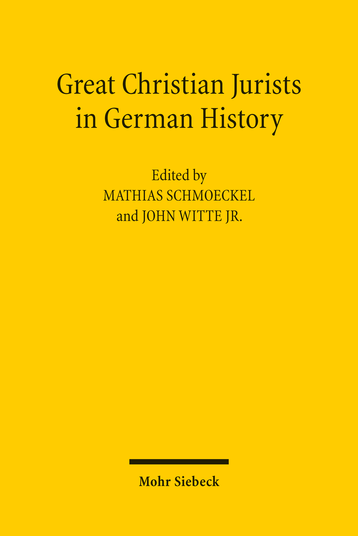(Source: Mohr Siebeck)
Mohr Siebeck is publishing an
edited collection on “Great Christian Jurists in German History”.
ABOUT THE BOOK
This volume is part of a
50-volume series on »Great Christian Jurists,« presenting the interaction of
law and Christianity through the biographies of 1000 legal figures of the past
two millennia. This volume presents 26 major German legal scholars from Albert
the Great and Eike von Repgow in the Middle Ages to Konrad Adenauer and Stephan
Kuttner in the twentieth century. Each chapter analyzes the influence of
Christianity on their lives and legal work and sketches their enduring
influence on the laws of church and state. Featuring freshly written chapters,
this is the first overview in English of the relationship of Christianity and
German law in the second millennium. Included are studies of both famous and
long forgotten Catholics and Protestants, and both martyrs and collaborators
with Nazism and earlier forms of state autocracy. Authoritative, accessible,
and engaging, this study is a vital scholarly resource and classroom text.
ABOUT THE AUTHOR
Mathias Schmoeckel Professor
of German and Rhenish Legal History and Executive Director of the
Institute of German and Rhenish Legal History and Civil Law at the University
of Bonn.
John Witte Robert W. Woodruff Professor of Law, McDonald Distinguished Professor of Religion, and Director of the Center for the Study of Law and Religion at Emory University School in Atlanta.
John Witte Robert W. Woodruff Professor of Law, McDonald Distinguished Professor of Religion, and Director of the Center for the Study of Law and Religion at Emory University School in Atlanta.
TABLE OF CONTENTS
Survey of contents
Ken Pennington: Johannes
Teutonicus (ca. 1170/75–1245) – Tilman Repgen: Eike von
Repgow (ca. 1180–1235) and the Christian Character of his Sachsenspiegel
– Sven Lichtmann/Hannes Möhle: Albertus Magnus (before
1200–1280) Natural Law as Law of Reason and its Significance for the Political
Order – Mathias Schmoeckel: Johann von Buch (1290–1356) and
the First Gloss of the Mirror of the Saxons – Gero Fuchs: Conrad
Peutinger (1465–1547) – John Witte Jr.: The Good Lutheran
Jurist Johann Oldendorp (ca. 1486–1567) – Wolfgang Forster: Andreas
Gail (1526–1587) – Heiner Lück: Matthew Wesenbeck (1531–1586):
Professor of Jurisprudence in Wittenberg – Cornel Zwierlein: Johannes
Althusius (1563–1638) – Pascal Förster: Dominicus Arumäus
(1579–1637) – Mathias Schmoeckel: Benedict Carpzov the Younger
(1595–1666) – Robert von Friedeburg: Samuel von Pufendorf
(1632–1694) – Steffen Schlinker: Gottfried Wilhelm Leibniz
(1646–1716) – Christoph Strohm: Christian Thomasius
(1655–1728) – Sebastian Michels: Carl Gottlieb Svarez
(1746–1798) – Joachim Rückert: Friedrich Carl von Savigny
(1779–1861) – Steffen Schlinker: Karl Friedrich Eichhorn
(1781–1854) – Hans-Georg Hermann: »Rescued from Scylla, to be
thrown to Charybdis”: Religious Conviction and the Separation of Church and
State in the Works of Sylvester Jordan (1792–1861) – Hans-Peter
Haferkamp: Moritz August von Bethmann-Hollweg (1795–1877) – Heinrich
de Wall: Friedrich Julius Stahl (1802–1861) – Malte Becker: Max
von Seydel (1846–1901) – Andreas Thier: Rudolph Sohm
(1841–1917) – Konrad Adenauer: Konrad Adenauer (1876–1967)
– Werner Schubert: Hans Nawiasky (1880–1961) – Joachim
Rückert: Eugen Bolz (1881–1945) Jurisprudence, Dictatorship, and the
Responsibilities of a Jurist and Christian* – Ken Pennington: Stephan
Georg Kuttner (1907–1996)
More info
here


No comments:
Post a Comment
Note: Only a member of this blog may post a comment.